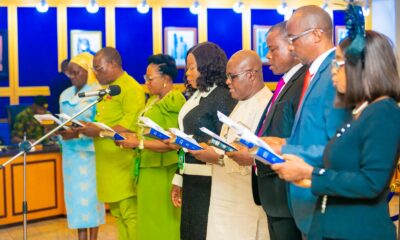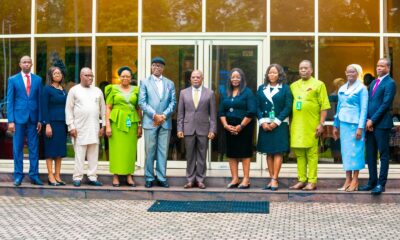Featured
Fresh Allegations Of N6.2bn Fraud Hits NDDC …As Appointee Petitions Lawan, Gbajabiamila …Buhari Gives NDDC Ultimatum To Pay Scholarship Monies

The crisis rocking the Niger Delta Development Commission (NDDC) hits harder as the Chairman of the Palliative Distribution Committee of the commission, Chief Sobomabo Jackrich, last Monday, alleged embezzlement of N6.2billion by the Interim Management Committee (IMC) led by Prof. Daniel Pondei under the guise of palliatives distribution.
Jackrich, in a 12-paragraph petition dated August 3, 2020, and separately addressed to the Senate President, Dr. Ahmad Lawan, and the Speaker, House of Representatives, Hon. Femi Gbajabiamila, stated that the N6.2billion palliatives scam was different from the N1.5billion relief funds shared to over 4,000 staffers of the commission and some members of the high command of the Nigeria Police Force by the IMC in April.
According to him, the N6.2billion was specifically approved by President Muhammadu Buhari in April this year for procurement and distribution of palliatives to residents of the nine states covered by the commission.
The commission’s Palliative Committee, chairman in his petition, titled “Demand for Investigation over alleged Misappropriation and Diversion of N6.2billion NDDC Palliatives Money”, further alleged that the Pondei-led IMC, pushed him aside as chairman of the Palliatives Distribution Committee when the money was to be spent.
He added that rather than using the money for the purposes for which it was meant for, the IMC only stage-managed the distribution of items not worth up to N1million.
The petition read in parts, “Today, all of that can be regrettably described as a show of shame and a scam. The N6,250,000,000.00 only that was magnanimously approved by Mr. President to help the poor and indigents of the Niger Delta during this difficult period of the pandemic as palliatives has curiously been allegedly misappropriated and embezzled by the IMC of the NDDC and their co-conspirators.
“As the chairman of the Palliatives Distribution Committee, my findings is not only that the money cannot be accounted for, but there is nothing on ground to show that that N6.2billion of our hard earned tax payers money was invested for its original purpose which the President approved.
”The materials and supplies according to the statement were to be done through Emergency Procurement method as provided in Sections 42(b) (c) and 43 of the Public Procurement Act, 2007″.
He consequently called for dissolution of the Pondei-led IMC to ensure thorough financial sanitation of the commission and allowing the motive behind the ongoing forensic auditing, to see the light of the day.
Expressing fury over the activities of the Pondei-led IMC, he further revealed that, “As the chairman of the Palliatives Distribution Committee, I cannot account for the palliatives as my committee was sidelined just because I as the chairman demanded for accountability and transparency in the processes as well as value for money with respect to the palliatives.
“That I was handed the template for the distribution of the Palliatives wherein it was indicated that nine trucks of food items will be distributed to each of the nine states in the region.
“However, the IMC hijacked the entire process. They called and handed me with few bags of rice and beans just to induce me to play along with them giving the false impression that the process was successful.
“This appears to me as a cover-up plot. Most of the food items that they claimed to have distributed were spoilt and unhealthy for human consumption.
“Thus only the IMC can tell where they got those poisonous and rotten food items from. The next thing we hear surprisingly, is that the palliatives has been distributed. I managed to monitor from a distance the charade and show-off since I and my committee was stripped of our assignments by the IMC in the distribution processes and left us incommunicado.
“As chairman of the Palliatives Distribution Committee, I am aware that what was distributed under the guise of medical equipment were old goods and wares in the commission’s warehouses which was put on Camera just to deceive the unsuspecting public and mislead the President.
“This too was staged. No single kits or Covid-19 Test Centres were set up by the commission in the Nine Niger Delta states till date. It is for the records that I state these facts. The money for Palliatives approved by Mr. President was allegedly corruptly diverted by the IMC in concert with identifiable powerful forces and so cannot be accounted for.
“Surprisingly again, at their corrupt leisure and malevolent unbridled appetite, the managing director openly on camera admitted to some disturbing embzzlement of unbudgetted funds in the commission during this pandemic. Responding to questions at the National Assembly regarding the Covid-19 Relief Fund paid to NDDC staff the MD said “ONLY N1.3 billion was used to take care of staff” despite being paid their salaries.
“There have been several barefaced embezzlement of billions of Naira from the Commission that was originally established to help the people of the region but to no avail”.
Jackruch also alleged that the Pondei-led committee was grossly involved in contracts scams.
According to him, the IMC smartly procured some dubious non-governmental organizations (NGO)’s to defend and cover up their corrupt practices and give them a clean bill through procured reports and presentations during the course of the recent investigations.
Similarly, President Muhammadu Buhari has given the Niger Delta Development Commission (NDDC) one week to pay the beneficiaries of the commission’s scholarship scheme.
The NDDC’s Director of Corporate Affairs, Charles Odili, revealed this after delivering the management’s invitation to the president, to inaugurate the 29-kilometre Ogbia-Nembe Road in Bayelsa State.
In a statement, yesterday, Odili said the students would be paid by the end of the week following Buhari’s order.
He explained that the delay was due to the sudden death of former Acting Executive Director, Finance and Administration, Ibanga Etang, in May.
“Under the commission’s finance protocol, only the executive director (finance) and the executive director (projects) can sign for the release of funds from the commission’s domiciliary accounts with the Central Bank of Nigeria,” Odili noted.
“With the death of Chief Etang, the remittance has to await the appointment of a new EDFA.
“Senator Akpabio, the Honourable Minister, said President Buhari who has been briefed on the protest by students at the Nigerian High Commission in London, has ordered that all stops be pulled to pay the students by the end of this week. We expect a new EDFA to be appointed this week. As soon as that is done, they would all be paid.”
The beneficiaries of NDDC’s scholarship in the UK, had, last Monday, protested over the non-payment of their tuition fees and allowances in one year.
The students gathered at the Nigerian High Commission in London, to express their displeasure over “negligence of their welfare”.
However, the Ijaw Youths Council (IYC) Worldwide has identified the ongoing delay in the payment of students under the scholarship scheme of the Niger Delta Development Commission (NDDC) as a fresh threat to the fragile peace in the Niger Delta region.
The new President of IYC, Comrade Peter Igbifa, who spoke in Port Harcourt, Rivers State, yesterday, described the conditions of the affected students in abroad as pitiable and unacceptable.
He said the youths were agitated to see their kinsmen carrying placards abroad to protest neglect by the NDDC and the Federal Government while huge resources belonging to their region were being diverted and squandered on frivolous activities.
“I watched the recent protest by the scholars and I was moved into tears. It is embarrassing, shameful and unacceptable to see our ambassadors abandoned and neglected by the NDDC and the Federal Government.
“Since my emergence as the 8th President of the IYC, this is one major issue that has been threatening the fragile peace and causing tension in the region.
“I have had to hold several meetings to calm down frayed nerves, who wanted to start fresh violent agitation over the suffering of our kinsmen sent abroad to study by the NDDC.
“There is a limit to which I can hold them back. If something drastic and urgent is not done to settle the financial obligations of these scholars, I am afraid, the temper will boil over and anything can happen,” Igbifa said.
The IYC boss wondered why sensitive issues affecting the region were not given the required swift attention by responsible authorities despite the huge revenue accruing to the country from the Niger Delta.
Igbifa called on President Muhammadu Buhari, the National Security Adviser (NSA) and the security chiefs to treat the issues of the abandoned Niger Delta students abroad as a matter of national emergency.
He said: “This is not the time to shift blames. The youths in the region are already angry and they don’t want to listen to any blame games.
“They don’t want the Federal Government to blame the NDDC and they don’t want the NDDC to blame the National Assembly or the Coronavirus pandemic. What they are expecting is an end to this shame.
“The NDDC management is appointed by the Presidency and it expected that the commission should be supervised strictly by the Presidency to ensure it lives up to the mandate of the NDDC Act.
“If it fails, it means the Federal Government has also failed in its supervisory role. Therefore, all of them have failed the Niger Delta.
“We hold them responsible for allowing this matter to degenerate to this embarrassing level.
“We want them to know that a new leadership of the IYC is on board and under my watch, the council, which is the umbrella body of all Ijaw youths worldwide will not tolerate this degree of recklessness”.
Igbifa appealed to Buhari to avert emerging crisis in the region by urgently giving directives to responsible authorities including the NDDC to settle the financial obligations of the abandoned students.
Meanwhile, the Niger Delta Development Commission (NDDC), yesterday, said it stood by the list of prominent Niger Delta leaders released by the Minister of Niger Delta Affairs, Senator Godswill Akpabio, as contractors in the commission, saying that what the minister released was only a tip of the iceberg.
The Director, Corporate Affairs, NDDC, Mr. Charles Odili, said the commission has details of the contracts and proxies used to collect them.
Speaking on the release of list of NDDC contracts handled by members of the National Assembly, Odili said: “The one submitted by Senator Akpabio was not compiled by the minister but came from the files in the commission.”
The NDDC spokesperson clarified that the list submitted to the National Assembly was actually compiled by the then management of the commission in 2018.
He observed that there was another set of lists for emergency project contracts awarded in 2017 and 2019, but added that these were not submitted to the National Assembly.
Odili affirmed: “The Interim Management Committee (IMC) of the commission stands by the list, which came from files already in the possession of the forensic auditors. It is not an Akpabio’s list, but the NDDC’s list. The list is part of the volume of 8,000 documents already handed over to the forensic auditors.”
He also said that prominent indigenes of the Niger Delta whose names were on the list should not panic, as the commission knew that people used the names of prominent persons in the region to secure contracts, adding that the ongoing forensic audit would unearth those behind the contracts.
The spokesperson said the intention of the list was to expose committee chairmen in the National Assembly who used fronts to collect contracts from the commission, some of which were never executed.
Odili added that the list did not include the unique case of 250 contracts which were signed for and collected in one day by one person, ostensibly for members of the National Assembly.
On the forensic audit exercise, he said that it was on course, and the commission had positioned 185 media support specialists to identify the sites of every project captured in its books for verification by the forensic auditors.
Odili advised members of the public to discountenance the “avalanche of falsehood being orchestrated by mischief makers,” regretting that “more insinuations and accusations may be thrown into the public space by those opposed to the IMC.”
On the payment of scholars, Odili explained: “The delay in the remittance of the fees was caused by the sudden death of Chief Ibanga Etang, the then Acting Executive Director, Finance and Administration (EDFA) of the commission in May.”
“Under the commission’s finance protocol, only the Executive Director (Finance) and the Executive Director (Projects) can sign for the release of funds from the commission’s domiciliary accounts with the Central Bank of Nigeria (CBN).
“With the death of Chief Etang, the remittance has to await the appointment of a new EDFA.”
Featured
Rivers A Strategic Hub for Nigeria’s Blue Economy -Ibas …Calls For Innovation-Driven Solutions
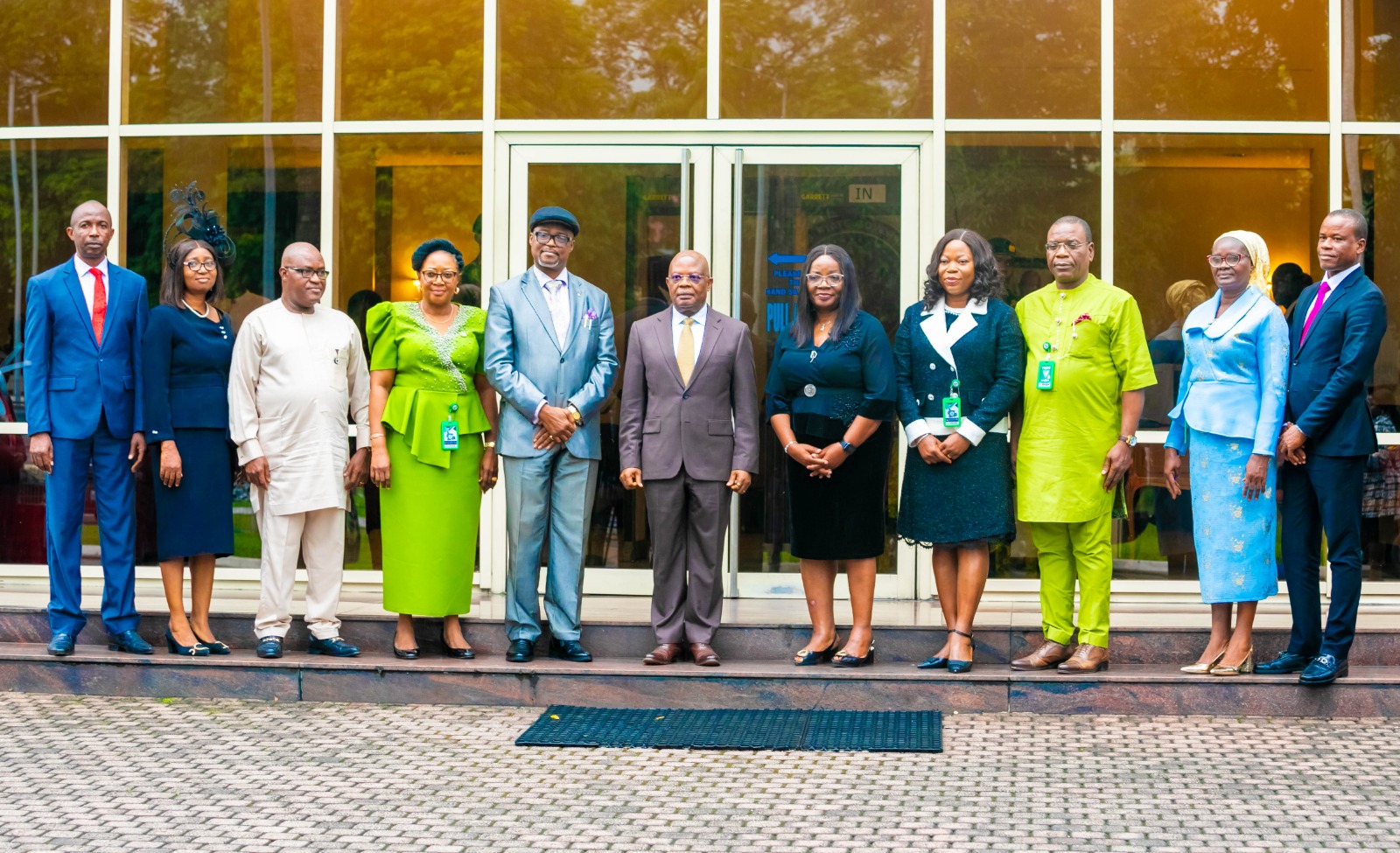
The Administrator of Rivers State, Vice Admiral (Rtd.) Ibok-Ete Ibas, has emphasized the need for innovation-driven strategies, strategic partnerships, and firm policy implementation to fully harness the vast potential of the blue economy.
Speaking during a courtesy visit by participants of Study Group 7 of the Executive Course 47 from the National Institute for Policy and Strategic Studies (NIPSS) at Government House, Port Harcourt, on Monday, Ibas highlighted the importance of diversifying Nigeria’s economy beyond oil by leveraging maritime resources to create jobs, enhance food security, strengthen climate resilience, and generate sustainable revenue.
The Administrator, according to a statement by his Senior Special Adviser on Media, Hector Igbikiowubo, noted that with coordinated efforts and innovative solutions, the blue economy could serve as a catalyst for inclusive growth, economic stability, and long-term environmental sustainability.
“It is estimated that a fully developed blue economy could generate over $296 million annually for Nigeria, spanning fisheries, shipping and logistics, marine tourism, offshore renewable energy, aquaculture, biotechnology, and coastal infrastructure,” he stated.
“We must transition from extractive practices to regenerative, inclusive, and innovation-driven solutions. This requires political cohesion, intergovernmental collaboration, robust infrastructure, and institutional capacity—all of which must be pursued with urgency and intentionality,” he added.
Ibas urged sub-national governments, particularly coastal states, to domesticate the national blue economy framework and develop tailored strategies that reflect their comparative advantages.
He stressed that such efforts must be guided by disciplined planning, regulation, and investment to maximize the sector’s potential.
Highlighting Rivers State’s pivotal role, the Administrator outlined its strategic advantages as follows:
•Nearly 30% of Nigeria’s total coastline (approximately 853km)
•Over 40% of Nigeria’s crude oil and gas output
•More than 33% of the country’s GDP and foreign exchange earnings
•416 of Nigeria’s 1,201 oil wells, many located in marine environments
•Two of Nigeria’s largest seaports, two oil refineries, and the Nigerian Liquefied Natural Gas (NLNG) terminal in Bonny Island—one of Africa’s most advanced gas facilities
Despite these opportunities, Ibas acknowledged challenges such as pollution, coastal erosion, illegal oil refining, unregulated fishing, inadequate infrastructure, and maritime insecurity.
He reaffirmed his administration’s commitment to institutional reforms, coastal zone management, and inter-agency collaboration to build a governance structure that supports a sustainable blue economy.
“Sustainability must be embedded in our development models from the outset, not as an afterthought. We are actively exploring partnerships in maritime education, aquaculture development, port modernization, and renewable ocean energy. We welcome knowledge-sharing engagements like this to refine our strategies and enhance implementation,” he said.
He urged the NIPSS delegation to ensure their findings translate into actionable recommendations that address the sector’s challenges.
Leader of the delegation, Vice Admiral A.A. Mustapha, explained that the visit aligns with their strategic institutional tour mandate on the 2025 theme: “Blue Economy and Sustainable Development in Nigeria: Issues, Challenges, and Opportunities.”
The group is engaging stakeholders to deepen understanding of policy efforts and institutional roles in advancing sustainable development through the blue economy.
Featured
INEC To Unveil New Party Registration Portal As Applications Hit 129

The Independent National Electoral Commission (INEC) has announced that it has now received a total of 129 applications from associations seeking registration as political parties.
The update was provided during the commission’s regular weekly meeting held in Abuja, yesterday.
According to a statement signed by the National Commissioner and Chairman of the Information and Voter Education Committee, Sam Olumekun, seven new applications were submitted within the past week, adding to the previous number.
“At its regular weekly meeting held today, Thursday 10th July 2025, the commission received a further update on additional requests from associations seeking registration as political parties.
“Since last week, seven more applications have been received, bringing the total number so far to 129. All the requests are being processed,” the commission stated.
The commission revealed the introduction of a new digital platform for political party registration. The platform is part of the Party Financial Reporting and Auditing System and aims to streamline the registration process.
Olumekun disclosed that final testing of the portal would be completed within the next week.
“INEC also plans to release comprehensive guidelines to help associations file their applications using the new system.
“Unlike the manual method used in previous registration, the Commission is introducing a political party registration portal, which is a module in our Party Financial Reporting and Auditing System.
“This will make the process faster and seamless. In the next week, the commission will conclude the final testing of the portal before deployment.
“Thereafter, the next step for associations that meet the requirements to proceed to the application stage will be announced. The commission will also issue guidelines to facilitate the filing of applications using the PFRAS,” the statement added.
In the meantime, the list of new associations that have submitted applications has been made available to the public on INEC’s website and other official platforms.
Featured
Tinubu Signs Four Tax Reform Bills Into Law …Says Nigeria Open For Business

President Bola Tinubu yesterday signed into law four tax reform bills aimed at transforming Nigeria’s fiscal and revenue framework.
The four bills include: the Nigeria Tax Bill, the Nigeria Tax Administration Bill, the Nigeria Revenue Service (Establishment) Bill, and the Joint Revenue Board (Establishment) Bill.
They were passed by the National Assembly after months of consultations with various interest groups and stakeholders.
The ceremony took place at the Presidential Villa, yesterday.
The ceremony was witnessed by the leadership of the National Assembly and some legislators, governors, ministers, and aides of the President.
The presidency had earlier stated that the laws would transform tax administration in the country, increase revenue generation, improve the business environment, and give a boost to domestic and foreign investments.
“When the new tax laws become operational, they are expected to significantly transform tax administration in the country, leading to increased revenue generation, improved business environment, and a boost in domestic and foreign investments,” Special Adviser to the President on Media, Bayo Onanuga said on Wednesday.
Before the signing of the four bills, President Tinubu had earlier yesterday, said the tax reform bills will reset Nigeria’s economic trajectory and simplify its complex fiscal landscape.
Announcing the development via his official X handle, yesterday, the President declared, “In a few hours, I will sign four landmark tax reform bills into law, ushering in a bold new era of economic governance in our country.”
Tinubu made a call to investors and citizens alike, saying, “Let the world know that Nigeria is open for business, and this time, everyone has a fair shot.”
He described the bills as not just technical adjustments but a direct intervention to ease burdens on struggling Nigerians.
“These reforms go beyond streamlining tax codes. They deliver the first major, pro-people tax cuts in a generation, targeted relief for low-income earners, small businesses, and families working hard to make ends meet,” Tinubu wrote.
According to the President, “They will unify our fragmented tax system, eliminate wasteful duplications, cut red tape, restore investor confidence, and entrench transparency and coordination at every level.”
He added that the long-standing burden of Nigeria’s tax structure had unfairly weighed down the vulnerable while enabling inefficiency.
The tax reforms, first introduced in October 2024, were part of Tinubu’s post-subsidy-removal recovery plan, aimed at expanding revenue without stifling productivity.
However, the bills faced turbulence at the National Assembly and amongst some state governors who rejected its passing in 2024.
At the NASS, the bills sparked heated debate, particularly around the revenue-sharing structure, which governors from the North opposed.
They warned that a shift toward derivation-based allocations, especially with VAT, could tilt fiscal balance in favour of southern states with stronger consumption bases.
After prolonged dialogue, the VAT rate remained at 7.5 per cent, and a new exemption was introduced to shield minimum wage earners from personal income tax.
By May 2025, the National Assembly passed the harmonised versions with broad support, driven in part by pressure from economic stakeholders and international observers who welcomed the clarity and efficiency the reforms promised.
In his tweet, Tinubu stressed that this is just the beginning of Nigeria’s tax evolution.
“We are laying the foundation for a tax regime that is fair, transparent, and fit for a modern, ambitious Nigeria.
“A tax regime that rewards enterprise, protects the vulnerable, and mobilises revenue without punishing productivity,” he stated.
He further acknowledged the contributions of the Presidential Fiscal Policy and Tax Reform Committee, the National Assembly, and Nigeria’s subnational governments.
The President added, “We are not just signing tax bills but rewriting the social contract.
“We are not there yet, but we are firmly on the road.”
-
Politics23 hours ago
Natasha’s Counsel Writes Senate Over Court Judgment
-
Nation22 hours ago
NIPR Practitioners Urge To Go Beyond Traditional Media Relations To Strategic Leadership Functions
-
Politics23 hours ago
Bayelsa APC Hails Late Buhari As Change Agent In Nigerian Politics
-
News20 hours ago
South-South contributes N34trn to Nigeria’s economy in 2024 – Institute
-
Niger Delta22 hours ago
Police Rescue Kidnap Victim, Recover Pistol In A’Ibom
-

 Politics22 hours ago
Politics22 hours agoINEC Trains Political Parties Officials On ICNP Use Ahead By-Elections
-
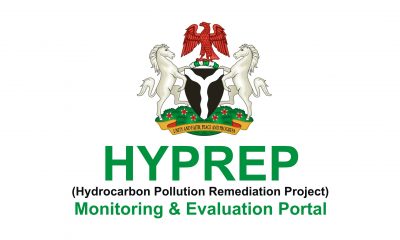
 Business23 hours ago
Business23 hours agoReplace Nipa Palms With Mangroove In Ogoni, Group Urges FG, HYPREP
-
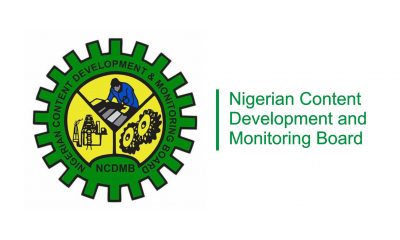
 Business20 hours ago
Business20 hours agoNCDMB, Dangote Refinery Unveil JTC On Deepening Local Content



